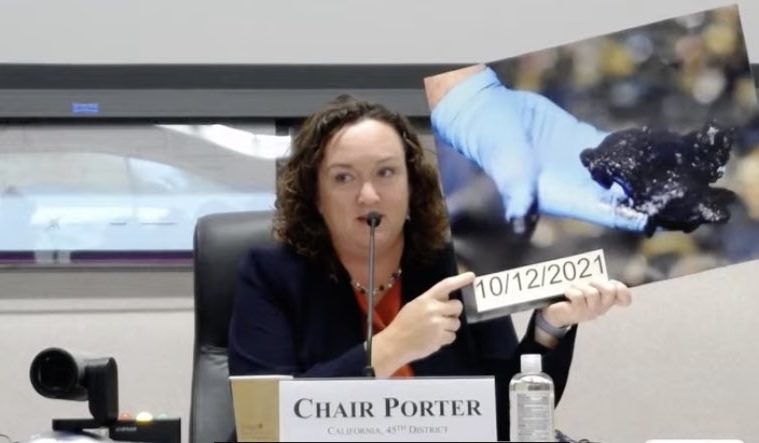Three U.S. representatives met with oil and environmental industry experts in a congressional hearing on Monday, Oct. 18, at the Irvine Ranch Water District, regarding the 25,000-gallon oil spill off the coast of Huntington Beach earlier this month.
With clean-up efforts now going into a third week, the spill has become the focus of both federal and state agencies. Irvine Rep. Katie Porter was joined by Congressmen Alan Lowenthal (D-Long Beach) and Mike Levin (D-San Juan Capistrano). They asked experts to comment on both the environmental and economic magnitude of the damages caused by the oil spill.
As of Tuesday, Oct. 19, the Orange County oil spill‘s Unified Command – The United States Coast Guard, and the California Department of Fish and Wildlife – had yet to identify a cause. However, the USCG has said the cause could be related to a cargo ship’s anchor.
Of the 25,000 gallons of oil that contaminated the Orange County shoreline, closing beaches and harbors from Sunset Beach to Dana Point, approximately 5,544 gallons of oil has been recovered.
Since the spill was reported on Oct. 1, more than 1,800 USCG, CDFW personnel, and 100 local volunteers have assisted in the clean-up efforts.
In her opening statement during Monday’s hearing, Rep. Katie Porter said crews have collected 250,000 pounds of oil-laced debris, and more than a dozen barrels of tarballs.
“The oil is so thick, it cannot be washed off with dishwashing detergent,” Porter said.
Porter also questioned the purpose of millions in oil subsidies for offshore oil rigs.
As the chair of the Natural Resources Oversight and Investigations Subcommittee, Porter said her research led her to discover that Beta Operating, a subsidiary of the parent company of Amplify Energy, which is responsible for the oil leak, received $20 million in government subsidies due to the low profitability of oil wells.
“It turns out that they got $20 million from the federal government, simply because the oil wells are at the end of their lives,” Porter said. “Taxpayers are being asked to pay to encourage oil production in the Pacific Ocean by giving oil companies millions of dollars to do it.”
At one point, Porter used a photo of a tarball, which are large formed clumps of oil that appear in the aftermath of a spill, and asked what its lifecycle was.
Dr. David Valentine, a professor of Earth Sciences at UC Santa Barbara, explained that depending on the density of a tarball, it will go with the current or settle on the seafloor.
Valentine said there is evidence that currents and wind have carried tarballs thousands of miles.
Following Valentine’s explanation on tarballs, Congressman Levin, a Democrat from California’s 49th District, said his priority was eliminating taxpayers from the equation when it comes to cleaning up the oil and gas industry.
“I think it’s important to avoid the sins of the future when it comes to cleaning up and decommissioning of oil wells,” he said.
Levin asked Valentine if California taxpayers should be concerned with the possibility of oil companies going bankrupt, and pushing the costs of decommission onto taxpayers.
“I think that we need to be very concerned – it’s already happening,” Valentine said.
Orange County Beaches have since reopened as of Monday, Oct. 11, after closing for just under a week. However, as of Oct. 19, fisheries remained closed.
In a statement, Lt. Christian Corbo, a state on-scene coordinator for the clean-up response, said testing is expected to begin on Oct. 24, and will be used to evaluate the safety of seafood.
“Onshore seafood sampling has been conducted and offshore testing is expected to start on October 24. Data collected and subsequent analysis of those samples will be used to evaluate seafood safety for fisheries in the areas affected by the Southern California spill,” Corbo said on Oct. 15. “The Director of California’s Department of Fish and Wildlife will reopen them upon recommendation by the CalEPA’s Office of Environmental Health Hazard Assessment.”
Advertising disclosure: We may receive compensation for some of the links in our stories. Thank you for supporting Irvine Weekly and our advertisers.

